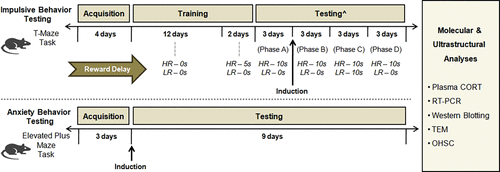当前位置:
X-MOL 学术
›
ACS Chem. Neurosci.
›
论文详情
Our official English website, www.x-mol.net, welcomes your
feedback! (Note: you will need to create a separate account there.)
3,4-Dihydroxyphenylethanol Assuages Cognitive Impulsivity in Alzheimer's Disease by Attuning HPA-Axis via Differential Crosstalk of α7 nAChR with MicroRNA-124 and HDAC6.
ACS Chemical Neuroscience ( IF 4.1 ) Pub Date : 2018-07-17 , DOI: 10.1021/acschemneuro.7b00532 Mohanasundaram ArunSundar 1 , Thukani Sathanantham Shanmugarajan 1 , Velayutham Ravichandiran 2
ACS Chemical Neuroscience ( IF 4.1 ) Pub Date : 2018-07-17 , DOI: 10.1021/acschemneuro.7b00532 Mohanasundaram ArunSundar 1 , Thukani Sathanantham Shanmugarajan 1 , Velayutham Ravichandiran 2
Affiliation

|
Cognitive impulsivity, a form of suboptimal cost-benefit decision making, is an illustrious attribute of an array of neurodegenerative diseases including Alzheimer's disease (AD). In this study, a delay discounting paradigm was used to assess the effect of 3,4-dihydroxyphenylethanol (DOPET) on cognitive impulsivity, in an oA42i (oligomeric amyloid β1-42 plus ibotenic acid) induced AD mouse model, using a nonspatial T-maze task. The results depicted that oA42i administration elevated cognitive impulsivity, whereas DOPET treatment attenuated the impulsive behavior and matched the choice of the sham-operated controls. In addition, DOPET treatment has ameliorated the anxiety-like behavior in the oA42i-challenged mice. Probing the molecular signaling cascades underpinning these functional ramifications in the oA42i-challenged mice revealed reduced cholinergic (α7 nAChR; alpha 7 nicotinic acetylcholine receptor) function, dysregulated hypothalamic-pituitary-adrenal (HPA) axis (manifested by amplified glucocorticoid receptor expression and plasma corticosterone levels), and also aberrations in the neuroepigenetic (microRNA-124, HDAC6 (histone deacetylase 6), and HSP90 (heat-shock protein 90) expressions) as well as nucleocytoplasmic (importin-α1 expression and nuclear ultra-architecture) continuum. Nonetheless, DOPET administration ameliorated these perturbations and the observations were in line with that of the sham-operated mice. Further validation of the results with organotypic hippocampal slice cultures (OHSCs) confirmed the in vivo findings. We opine that HPA-axis attunement by DOPET might be orchestrated through the α7 nAChR-mediated pathway. Based on these outcomes, we posit that 3,4-dihydroxyphenylethanol might be a potential multimodal agent for the management of cognitive impulsivity and neuromolecular quagmire in AD.
中文翻译:

3,4-二羟基苯基乙醇通过与MicroRNA-124和HDAC6的α7nAChR的微分串扰来调节HPA轴,从而减轻阿尔茨海默氏病的认知冲动。
认知冲动是次优成本收益决策的一种形式,它是一系列神经退行性疾病(包括阿尔茨海默氏病(AD))的杰出表现。在这项研究中,采用延迟贴现范式,使用非空间T-迷宫任务。结果表明,oA42i给药可提高认知冲动,而DOPET治疗可减弱冲动行为,并与假手术对照组的选择相匹配。此外,DOPET治疗改善了oA42i攻击的小鼠的焦虑样行为。在oA42i攻击的小鼠中探测支持这些功能性分支的分子信号传导级联反应,显示胆碱能(α7nAChR;α7烟碱乙酰胆碱受体)功能降低,下丘脑-垂体-肾上腺(HPA)轴失调(表现为糖皮质激素受体表达的增加和血浆皮质类固醇激素)水平),以及神经表观遗传(microRNA-124,HDAC6(组蛋白去乙酰化酶6)和HSP90(热休克蛋白90)表达)以及核质(importin-α1表达和核超结构)连续体中的畸变。尽管如此,DOPET给药改善了这些扰动,并且观察结果与假手术小鼠的观察结果一致。用器官型海马切片培养物(OHSCs)对结果进行进一步验证,证实了体内发现。我们认为,DOPET对HPA轴的调节可能是通过α7nAChR介导的途径进行的。基于这些结果,我们认为3,4-二羟基苯乙醇可能是AD中认知冲动和神经分子泥潭管理的潜在多峰制剂。
更新日期:2018-06-14
中文翻译:

3,4-二羟基苯基乙醇通过与MicroRNA-124和HDAC6的α7nAChR的微分串扰来调节HPA轴,从而减轻阿尔茨海默氏病的认知冲动。
认知冲动是次优成本收益决策的一种形式,它是一系列神经退行性疾病(包括阿尔茨海默氏病(AD))的杰出表现。在这项研究中,采用延迟贴现范式,使用非空间T-迷宫任务。结果表明,oA42i给药可提高认知冲动,而DOPET治疗可减弱冲动行为,并与假手术对照组的选择相匹配。此外,DOPET治疗改善了oA42i攻击的小鼠的焦虑样行为。在oA42i攻击的小鼠中探测支持这些功能性分支的分子信号传导级联反应,显示胆碱能(α7nAChR;α7烟碱乙酰胆碱受体)功能降低,下丘脑-垂体-肾上腺(HPA)轴失调(表现为糖皮质激素受体表达的增加和血浆皮质类固醇激素)水平),以及神经表观遗传(microRNA-124,HDAC6(组蛋白去乙酰化酶6)和HSP90(热休克蛋白90)表达)以及核质(importin-α1表达和核超结构)连续体中的畸变。尽管如此,DOPET给药改善了这些扰动,并且观察结果与假手术小鼠的观察结果一致。用器官型海马切片培养物(OHSCs)对结果进行进一步验证,证实了体内发现。我们认为,DOPET对HPA轴的调节可能是通过α7nAChR介导的途径进行的。基于这些结果,我们认为3,4-二羟基苯乙醇可能是AD中认知冲动和神经分子泥潭管理的潜在多峰制剂。











































 京公网安备 11010802027423号
京公网安备 11010802027423号